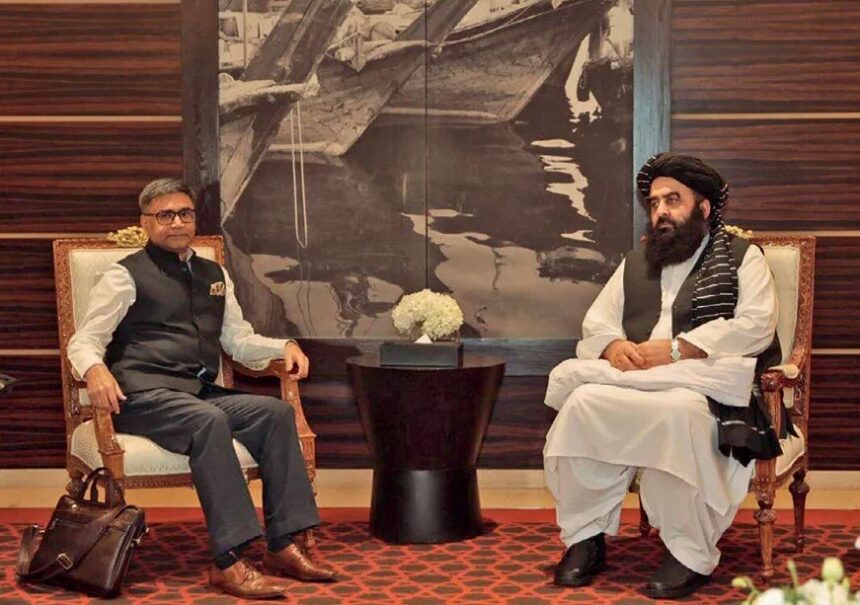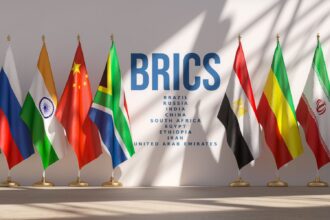India’s latest engagement with Afghanistan’s Taliban-led government marks a significant shift in its diplomatic strategy, underscoring a pragmatic approach to evolving geopolitical realities in the region. This move comes more than three years after the fall of Kabul in 2021, a moment that dealt a major blow to India’s strategic and diplomatic standing in Afghanistan.
India’s Changing Stance on the Taliban
For two decades, India had invested heavily in Afghanistan’s democratic development, funding major infrastructure projects, providing military training and offering thousands of scholarships. However, the Taliban’s takeover rapidly dismantled these efforts, opening the door for regional competitors like Pakistan and China to expand their influence.
Now, a notable shift is underway. Last week, India’s Deputy National Security Adviser, Vikram Misri, met with Afghanistan’s acting Foreign Minister, Amir Khan Muttaqi, in Dubai. This marks the highest-level engagement between India and the Taliban government since its return to power. The Taliban, in turn, expressed a strong interest in fostering political and economic ties with India, recognizing it as a key regional player.
Strategic and Economic Motivations
At the core of these discussions was trade expansion and the strategic utilization of Iran’s Chabahar Port. India has been actively developing this port to bypass reliance on Pakistani routes like Karachi and Gwadar. Enhancing connectivity through Afghanistan would further strengthen India’s access to Central Asian markets, a long-term strategic goal.
Experts see this meeting as a milestone in India’s foreign policy. Michael Kugelman, an analyst at the Wilson Center, noted that India’s diplomatic engagement effectively grants the Taliban de facto legitimacy. Given that India had previously distanced itself from the group, this shift signals a significant recalibration of priorities.
The Taliban’s Global Standing and China’s Influence
Since reclaiming power, the Taliban has sought international recognition, but no country has formally acknowledged its government. However, over 40 nations maintain some level of diplomatic or informal engagement.
China has taken the most proactive stance, establishing an ambassador in Afghanistan and engaging with the Taliban on economic and security matters. Beijing sees Afghanistan as a key component of its Belt and Road Initiative and a strategic buffer against instability along its western borders. India, meanwhile, has adopted a more cautious approach, balancing engagement with concerns over security and human rights.
Evolving Pakistan-Taliban Relations
Another factor influencing India’s outreach is the growing tension between Afghanistan and Pakistan. Islamabad has accused the Afghan Taliban of providing sanctuary to the Tehrik-i-Taliban Pakistan (TTP), a militant group responsible for attacks within Pakistan. Just days before the India-Taliban talks, Pakistani airstrikes reportedly killed dozens in eastern Afghanistan, sparking strong condemnation from the Taliban government.
Historically, Pakistan has been a close ally of the Taliban, but recent events have strained this relationship. This deterioration provides India with an opportunity to strengthen its own diplomatic leverage in the region.
India’s Interests in Afghanistan
Beyond geopolitical competition with Pakistan, India’s outreach to the Taliban is driven by several strategic goals:
- Counterterrorism Measures – India seeks to ensure that Taliban-controlled Afghanistan does not become a base for anti-India terrorist groups.
- Economic Expansion – Afghanistan serves as a crucial gateway to Central Asia, a region India aims to access via trade corridors.
- Public Diplomacy – India has long been a major donor to Afghanistan’s development projects, fostering goodwill among Afghan citizens.
- Regional Connectivity – Strengthening the Chabahar Port’s role in regional trade aligns with India’s long-term infrastructure goals.
Potential Risks and Challenges
Despite the potential benefits, India’s engagement with the Taliban comes with inherent risks. The Taliban’s history of extremism, human rights violations—particularly concerning women’s rights—and its ties to various militant groups remain major concerns.
As Michael Kugelman pointed out, India’s outreach may reduce immediate security threats but does not eliminate the long-term unpredictability of the Taliban’s actions. “The key question remains: Can India truly trust an actor like the Taliban?” he noted.
Former Indian Ambassador to Afghanistan, Jayant Prasad, however, downplayed these risks. He argued that India’s engagement does not imply endorsement but is a necessary step in maintaining regional stability. “Ignoring the Taliban will not help the Afghan people. Some level of diplomatic pressure might encourage internal reforms,” he stated.
The Taliban’s Desire for Legitimacy
The Taliban is acutely aware that international recognition hinges on addressing global concerns, particularly those related to human rights. Analysts suggest that India’s engagement could serve as leverage to push for policy changes, particularly in restoring rights for women and minorities.
“The Taliban craves recognition,” Prasad emphasized. “They know reforms are necessary to achieve that.”
A Pragmatic Realignment
India’s evolving stance on the Taliban reflects a broader realignment in its foreign policy. Rather than isolating Afghanistan, India is choosing to engage cautiously, balancing strategic interests with security concerns.
As tensions between Afghanistan and Pakistan escalate and China continues to expand its influence, India’s latest diplomatic outreach signals a calculated move to reassert its role in the region. The coming months will reveal whether this engagement translates into tangible benefits or if the risks outweigh the rewards.













